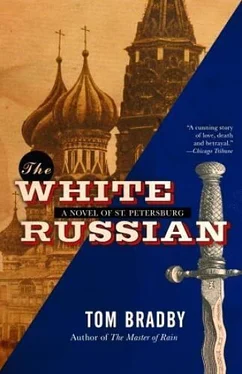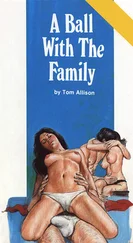“Another night of Jew bashing,” Ruzsky muttered as he and Pavel watched their approach. The Black Bands were gangs of street thugs funded by the secret police to attack opponents of the Tsar. Mostly, they spent their time organizing pogroms against the Jews.
The men mounted the steps, still singing. The figure carrying the portrait was a young man with a fleshy face flushed red from alcohol and exertion, and a thin, pencil mustache. In his left hand, Ruzsky could see a knuckle duster. He stopped. “New Year, New Happiness,” he said.
Neither Ruzsky nor Pavel answered.
“God save the Tsar!”
This was what all of these gangs did, demanding a show of loyalty as an excuse to beat anyone who wouldn’t offer it. “Fuck off,” Ruzsky said.
The man took a pace forward, his face livid.
“We’re police officers,” Pavel added. “There’s been a murder. Move on, please.”
Pavel’s tone had been more conciliatory, but the leader of the group brushed him aside. “If you’re police officers, you should want to show your loyalty to the Tsar.”
“Go away, before I arrest you,” Ruzsky went on.
“You? Arrest us?” The man did not move, and, for a moment, he looked as if he would strike them. Ruzsky felt the weight of the Sauvage revolver in his pocket. As it had been often before his exile, the temptation to bring these kind of scum down to size was overwhelming.
There was a shout from the river. Close to the embankment-about fifty feet away-one of the constables was holding something above his head.
Ruzsky and Pavel pushed past the thugs and strode out onto the ice. Behind them, the men of the Black Bands began to sing “God Save the Tsar” again.
“I’ve found it, sir!” the constable shouted as they approached him. He offered Ruzsky the knife.
“Christ,” Pavel whispered.
It was an old, crude black dagger. Ruzsky held it up so that he could see the twisted iron handle more clearly. There was some inscription by the base of the blade, partly obscured by dried blood. It looked like Sanskrit, or Arabic. He turned it over in his hand and then passed it to Pavel.
Ruzsky faced the embankment. The gang of thugs had disappeared from view, the sound of their singing now just a faint echo across the river. “Why would he do that?” Ruzsky asked.
“Do what?”
“He follows them so carefully out here, then throws away the murder weapon.”
“He must have been wearing gloves. There won’t be any fingerprints.”
“It’s still careless. Why throw it away?”
“Panic.”
“He wasn’t panicking when he retraced his steps, going backward.”
Pavel returned the knife to the constable. “Take it straight to the office and give it to Veresov. If he’s not in his room, telephone him at home and say the chief investigator would like his help and he is to come in immediately.”
The constable ran off in the direction of the palace. They watched him go. “In its way, it’s all a bit theatrical, isn’t it?” Pavel said, gesturing toward the patch of blood in the center of the ice. “Following in the footsteps and so on.”
“If you call being stabbed a dozen times theatrical.” Ruzsky turned to his partner. “It’s certainly not straightforward, I’ll grant you that.”
P avel was hungry, so Ruzsky agreed to go briefly to a café for breakfast. The route to their favorite haunt took them around the front of the Winter Palace, past the Hermitage, and into Millionnaya Street, where the wind funneled down from Palace Square had swept deep drifts up against the walls of the houses. Outside the barracks of the first battalion of the Preobrazhensky Guards-his father’s regiment-a sentry stamped his feet hard.
As they walked down Millionnaya Street, they heard a muffled shout and turned to see a detachment of the Imperial Guard Cavalry entering the street behind them, the horses’ hooves clattering on the treacherous cobblestones, their breath hanging on the cold morning air.
Ruzsky and Pavel waited as they passed. The men were from the elite Chevalier Guard Regiment, mounted on their distinctive chestnut mares. They were in full parade uniform, the soldiers’ white and red jackets visible beneath long blue overcoats, their swords clanking beside them, their scabbards bright. The officer wore a cape over his blue and red jacket, fastened at the throat with a gold buckle. All of the men had upon their heads the curved brass helmet of the guard, with the large imperial eagle at its peak.
There were no shouts or barked commands; they were trying to avoid waking the aristocratic residents of one of the city’s wealthiest districts. As they reached a stretch of the street that was covered in snow, their progress was suddenly silent.
Halfway down, Ruzsky stopped outside a house with a delicately sculpted, soft yellow facade. The shutters were closed. This had always been his family’s home in the city. He’d been born here. So had both of his brothers. Pavel stood behind him and Ruzsky found it hard to move on. In the cold dawn light, a sense of overpowering loneliness settled upon him.
He thought of Michael in his room in the attic and wondered which of his own toys were still on the shelves above the small bed.
Pavel waited patiently. He knew the truth-or some of it-and did not wish to intrude. “They’ll still be asleep,” he said quietly.
Ruzsky tore himself away and forced himself to keep walking. As they emerged from the far end of the street onto the Field of Mars, past the Pavlovsky Guards barracks, he felt like a champagne cork escaping from the neck of a bottle. Just to be in the street was to feel the pressure of his own history.
The Field of Mars was a sandy expanse designed for military training now shrouded in a thick layer of snow. The detachment of cavalry cantered around it, turning and wheeling as it exercised as a unit, still quiet but for the snorts of the horses, the clank of metal, and the occasional barked command.
Pavel and Ruzsky walked around the square, past the giant yellow-stone palaces that faced onto it. All the windows were dark, but outside one a private sled driver stood next to his horse, banging his hands together. Just in front, beneath a gas lamp, another servant waited for a small, dirty-white Pekinese to do its business. Neither man acknowledged them as they passed.
Walking on toward the Summer Gardens, Ruzsky felt his heart lurch as he saw a tall man striding in their direction, trailing behind a big brown hunting dog. The man’s purposeful gait and the type of hound-big dogs were unusual in Petersburg houses-made him think for a few seconds that it must be his father Nicholas. As they came closer, the realization that it wasn’t brought both relief and disappointment.
The café was on a ground floor of a large tenement block the other side of the Moyka Canal. Pavel ate bread. Ruzsky sobered himself up fully with Turkish coffee and cigarettes. Their drinking had gone on into the early hours and the alcohol was still circulating in his bloodstream. His feet were sore and damp and he only gradually regained feeling in his toes.
The café was run by a short, swarthy Ukrainian from the Crimea and was full even at this time in the morning, the air thick with steam, body heat, and cigarette smoke. A small group of the abjectly poor milled around outside the door, glancing in at the warmth and the food, their faces gradually obscured by the mist gathering on the thick glass windows.
The black Romanov eagle was etched in the center of the panes either side of the door, and there was a line drawing of the royal palace at Livadia on the wall above Pavel’s head. The owner’s father had been a member of the imperial household at the Tsar’s summer home in the Crimea and the son remained fanatically loyal not only to the Tsar and his family, but to the principles of autocracy. But his food was good and, more importantly, cheap.
Читать дальше












